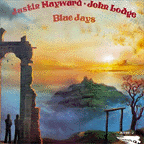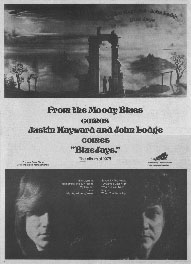![]()
  |

Blue Jays
Justin Hayward and John Lodge
Threshold THS 14
Released: March 1975
Chart Peak: #16
Weeks Charted: 23

 At least in terms of sound, Justin Hayward and John Lodge, guitarist and bass player, respectively, with the currently inactive Moody Blues, have created in Blue Jays the ultimate Moody Blues album. It is the same sound that established the Moodys' mass popularity in 1968 with Days of Future Passed: basic rock instrumentation heavily overlaid with Mellotron or string orchestra, and vocals treated as instruments in the Wagnerian manner. In strictly musical terms, however, the Moody Blues are far from Wagnerian. Simple melodic themes are elongated to accomodate a dramatic sense about as sophisticated as a mediocre Fifties soundtrack, their emotional import exaggerated by such devices as rapidly swelling orchestration and gargantuan crescendo.
At least in terms of sound, Justin Hayward and John Lodge, guitarist and bass player, respectively, with the currently inactive Moody Blues, have created in Blue Jays the ultimate Moody Blues album. It is the same sound that established the Moodys' mass popularity in 1968 with Days of Future Passed: basic rock instrumentation heavily overlaid with Mellotron or string orchestra, and vocals treated as instruments in the Wagnerian manner. In strictly musical terms, however, the Moody Blues are far from Wagnerian. Simple melodic themes are elongated to accomodate a dramatic sense about as sophisticated as a mediocre Fifties soundtrack, their emotional import exaggerated by such devices as rapidly swelling orchestration and gargantuan crescendo.
 Click image for larger view. |
- Long is the road, that takes you from home
- My baby, oh my darling
- And sleepless are the hours
- And lonely is the night
- For the poor tormented soul
- Who is searching for the light
- My baby, oh my darling
Writes John Lodge in "Saved by the Music":
- When you're following all life's lies
- And find its meaning
- And truth still hides
- Don't cover your face
- Let the warmth come flowing through
- Welcome dawn new morning dew
- And find its meaning
Pompous, dumb and self-pitying, these lyrics mark an all-time low for both writers, though it should hardly matter to Moody Blues lovers. What matters most is gorgeous sound. All ten of the cuts on Blue Jays are ballads, and three of them feature an orchestra led by Peter Knight, who also conducted on Days of Future Passed. Blue Jays is a tonal bath, all sound and nothing but sound, the perfect background music for the kind of person who whispers "I love you" to a one-night stand.
- Stephen Holden, Rolling Stone, 5/8/75.
Bonus Review
The Moody Blues were just about the best at what they did, which was a little schlocky but awfully nice sometimes, and it isn't surprising that ex-Moodies Justin Hayward and John Lodge, backed by some non-Moodies, still have that sound, that gently suggesting old wood and leather and a time when melodies, by Gadfrey, were melodies. And, er, when words tended to be either pompous or frightfully banal, depending on whether they were Making a Statement or passing the time. Well, we can't have everything. "You," in any case, is, with all its fancy orchestration, a nice tune, catchy the way a good Moodies tune was catchy, while "Remember Me, My Friend" is catchy the way a bad one was, the kind that gets on the radio and hangs on like a toothache. "Saved by the Music" indicates some of the bad ones aren't catchy, and that however you strip down the Moody Blues they were always a bit awkward at rocking. But the rest of the album is only a little schlocky, and awfully nice in spots.
- Noel Coppage, Stereo Review, 7/75.
![]() Reader's Comments
Reader's Comments
No comments so far, be the first to comment.
